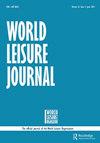冒险:流动的现代性和极限户外实践者
IF 2
Q3 HOSPITALITY, LEISURE, SPORT & TOURISM
引用次数: 0
摘要
近几十年来,户外极限运动在自然环境中的数量显著增加。可以说,如今,极限户外运动比以往任何时候都更受欢迎。部分原因可能在于,我们发现自己处于齐格蒙特·鲍曼(Zygmunt Bauman)所说的流动现代性(liquid modernity)的社会历史背景中,这种背景已经将一些以前被认为是边缘和/或排他性的活动转变为主流。流动现代性的概念说明了当代社会的社会结构和身份是如何以不可预测性和变化为特征的,在其后果中,我们发现了户外体育运动实践的多元化。通过18个半结构化访谈,本研究旨在更好地了解流动现代性对极限户外从业者的影响。分级内容分析确定了两个主要主题:(A)自由和强度,(b)实践的多样性。论文最后提出了一些实际意义和建议,以便进一步研究,继续阐明极限户外运动及其实践者的现象。关键词:极限户外运动冒险寻求刺激流动现代性披露声明作者未报告潜在利益冲突。本文章由计算机程序翻译,如有差异,请以英文原文为准。
Risk-Taking: Liquid Modernity and Extreme Outdoor Practitioners
ABSTRACTIn recent decades, the number of extreme outdoor sports in the natural environment has increased significantly. It could be said that, nowadays, extreme outdoor sports are more popular than ever. Part of the explanation probably lies in the fact that we find ourselves in the socio-historical context that Zygmunt Bauman called liquid modernity, which has transformed several activities, previously considered as marginal and/or exclusive, into mainstream. The concept of liquid modernity illustrates how social structures and identities are characterized by unpredictability and change in contemporary societies, and among its consequences we find the pluralization of outdoor physical-sports practices. Through 18 semi-structured interviews, this study set out to better understand the impact liquid modernity has had on extreme outdoor practitioners. A hierarchical content analysis led to the identification of two main themes: (a) freedom and intensity, and (b) a plurality of practices. The paper concludes with a number of practical implications and suggestions for further research that would continue to shed light on the phenomenon of extreme outdoor sports and their practitioners.KEYWORDS: Extreme outdoor sportsrisk-takingsensation-seekingliquid modernity Disclosure statementNo potential conflict of interest was reported by the author(s).
求助全文
通过发布文献求助,成功后即可免费获取论文全文。
去求助
来源期刊

World Leisure Journal
HOSPITALITY, LEISURE, SPORT & TOURISM-
CiteScore
3.10
自引率
6.20%
发文量
34
期刊介绍:
As the official journal of the World Leisure Organisation, the purpose of the World Leisure Journal is to stimulate and communicate research, theory, and critical thought in all areas that address leisure, including play, recreation, the arts and culture, sport, festivals, events and celebrations, health and fitness, and travel and tourism. Empirical and theoretical manuscripts, as well as position papers, review articles, and critical essays are published in the World Leisure Journal . The World Leisure Journal is international in scope, and encourages submissions from authors from all areas of the world. Comparative cross-national and cross-cultural research reports are especially welcome. For empirical papers, all types of research methods are appropriate and the subject matter in papers may be addressed from perspectives derived from the social, behavioural, and biological sciences, education, and the humanities. Both pure and applied research reports are appropriate for publication in the World Leisure Journal . In addition to original research reports and review essays, book reviews, research notes, comments, and methodological contributions are appropriate for publication in the World Leisure Journal .
 求助内容:
求助内容: 应助结果提醒方式:
应助结果提醒方式:


